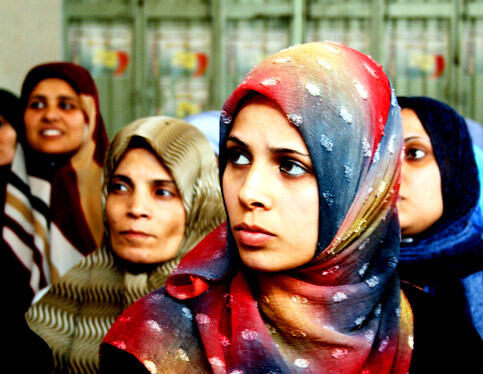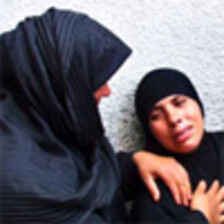The Electronic Intifada 7 March 2007

Palestinian women face a dual burden with as the occupation increases social pressures. (Tom Spender/IRIN)
RAMALLAH, 7 March 2007 (IRIN) - Three Palestinian women were shot dead in the northern Gaza Strip last month — rumours say it had to do with ‘honour’.
The corpses of the women — Ibtisam Mohammad Musallam Abu Qeinas, 31; Samira Tahani Debeiky, 45; and Amani Khamis Hosari, 40 - were found within a 24-hour period in Beit Lahiya and Gaza City, leaving residents shocked.
“People are saying it was an honour killing, that the women were of loose morals. They were not related to one another - but they were all killed in the same way. It’s really shocking,” said Mona Shawa, director of the women’s unit at the Palestinian Centre for Human Rights in Gaza.
So-called honour crimes are the murders of women who are thought to have brought shame on their families by, for example, having sex before marriage or even for having been the victim of rape or incest.
In 2006, 17 Palestinian women were reported killed in so-called honour crimes — 12 in the Gaza Strip and five in the West Bank.
“The general atmosphere here in Gaza is encouraging this - there is no respect for law, no punishment of criminals and everyone has a gun,” Shawa added.
Soraida Abed Hussein, a researcher at the Women’s Centre for Legal Aid and Counselling (WCLAC) in Ramallah, uses the word ‘femicide’ to describe honour killings.
She says Palestinian society is undergoing radical change as a result of the daily violence of the Israeli-Palestinian conflict — and women are suffering as a result.
“Being under oppressive occupation gives you a feeling of low self-esteem, of being less intelligent, less powerful, less of everything,” she said.
Radically changing society
“That hits the masculine identity — and women pay the price. Men internalise the values of violence. They replicate the roles of occupier and victim. It will become part of the culture — part of how you see people and they see you. We are now at the stage where it is radically changing our society and structures.”
Hussein told IRIN that the numbers of ‘femicide’ cases had increased from pre-intifada (Palestinian uprising against Israeli occupation) levels and that the true number of killings is not known because they are not reported.
“We can’t rely on the police. And if you look in the court registry of deaths, there are sometimes women whose cause of death is entered as ‘Qada wa Qader’ [literally ‘fate’] — death by natural causes. But the women are young,” she said.
In a report released last November, Human Rights Watch criticised the Palestinian authorities for not doing enough to protect women and said the conflict with Israel and the economic crisis stemming from a year-long international economic boycott of the Palestinian Authority (PA) were no excuse.
Article 340 of Jordanian Penal Law, in force in the West Bank, rules that a man who kills or attacks his wife or a female relative while she is committing adultery is exempt from punishment. In Gaza, the Egyptian penal code also provides reductions in sentence.
“This law does not apply if the woman finds a man committing an affair — because the woman herself is the honour. Her movements are observed and controlled for the sake of controlling her sexuality,” said Hussein.
But ‘femicide’ in Palestinian society is a sensitive issue to campaign on, Hussein said, because criticising the society plays into the hands of those who say Arab culture is primitive and violent.
“We leave ourselves vulnerable to those who want to say our society is bad and we are also condemned by those inside our society who say such things should not be brought into the open,” she said.
“At the same time, we are under occupation — so should we be fighting against the occupiers or our husbands? Even if we want to campaign, we are so busy reacting to the new crises in our daily lives that it is hard to get organised.”
These pressures are leading Palestinian society to entrench itself in its traditions at the expense of individual wellbeing, Hussein said.
“In our workshops we ask women what they want and they find it difficult to answer. In the society now everyone watches everyone else and talks about those who don’t respect the code. We put each other under pressure. Women’s wishes are no longer articulated and they no longer say what they want or think,” she said.
Dr Miriam Salih, the Hamas Minister of Women’s Affairs, said Palestinians themselves could decide on a change to the law on honour crimes.
“Our main priority is to face occupation. When we have an independent state, we will put the law before the people to decide,” Salih said.
This item comes to you via IRIN, a UN humanitarian news and information service, but may not necessarily reflect the views of the United Nations or its agencies. All IRIN material may be reposted or reprinted free-of-charge; refer to the copyright page for conditions of use. IRIN is a project of the UN Office for the Coordination of Humanitarian Affairs.
Related Links
